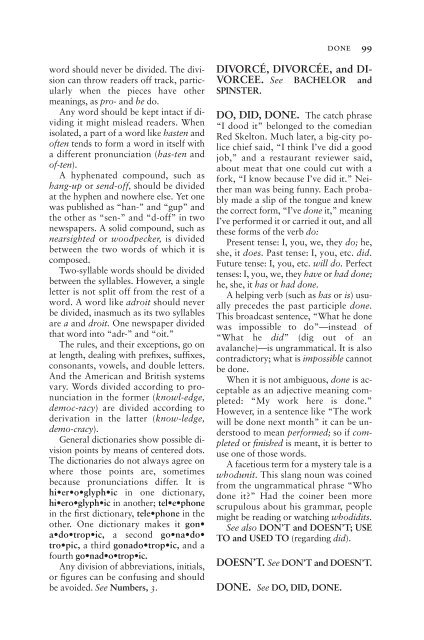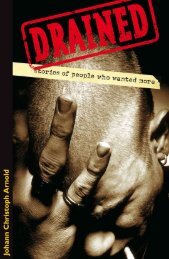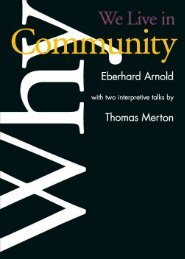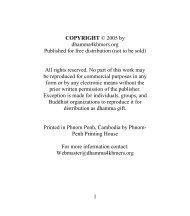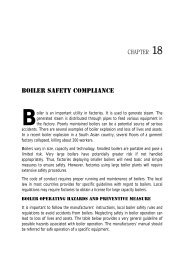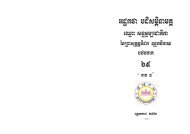The Penguin Dictionary of American English Usage and Style : A ...
The Penguin Dictionary of American English Usage and Style : A ...
The Penguin Dictionary of American English Usage and Style : A ...
Create successful ePaper yourself
Turn your PDF publications into a flip-book with our unique Google optimized e-Paper software.
done 99<br />
word should never be divided. <strong>The</strong> division<br />
can throw readers <strong>of</strong>f track, particularly<br />
when the pieces have other<br />
meanings, as pro- <strong>and</strong> be do.<br />
Any word should be kept intact if dividing<br />
it might mislead readers. When<br />
isolated, a part <strong>of</strong> a word like hasten <strong>and</strong><br />
<strong>of</strong>ten tends to form a word in itself with<br />
a different pronunciation (has-ten <strong>and</strong><br />
<strong>of</strong>-ten).<br />
A hyphenated compound, such as<br />
hang-up or send-<strong>of</strong>f, should be divided<br />
at the hyphen <strong>and</strong> nowhere else. Yet one<br />
was published as “han-” <strong>and</strong> “gup” <strong>and</strong><br />
the other as “sen-” <strong>and</strong> “d-<strong>of</strong>f” in two<br />
newspapers. A solid compound, such as<br />
nearsighted or woodpecker, is divided<br />
between the two words <strong>of</strong> which it is<br />
composed.<br />
Two-syllable words should be divided<br />
between the syllables. However, a single<br />
letter is not split <strong>of</strong>f from the rest <strong>of</strong> a<br />
word. A word like adroit should never<br />
be divided, inasmuch as its two syllables<br />
are a <strong>and</strong> droit. One newspaper divided<br />
that word into “adr-” <strong>and</strong> “oit.”<br />
<strong>The</strong> rules, <strong>and</strong> their exceptions, go on<br />
at length, dealing with prefixes, suffixes,<br />
consonants, vowels, <strong>and</strong> double letters.<br />
And the <strong>American</strong> <strong>and</strong> British systems<br />
vary. Words divided according to pronunciation<br />
in the former (knowl-edge,<br />
democ-racy) are divided according to<br />
derivation in the latter (know-ledge,<br />
demo-cracy).<br />
General dictionaries show possible division<br />
points by means <strong>of</strong> centered dots.<br />
<strong>The</strong> dictionaries do not always agree on<br />
where those points are, sometimes<br />
because pronunciations differ. It is<br />
hi•er•o•glyph•ic in one dictionary,<br />
hi•ero•glyph•ic in another; tel•e•phone<br />
in the first dictionary, tele•phone in the<br />
other. One dictionary makes it gon•<br />
a•do•trop•ic, a second go•na•do•<br />
tro•pic, a third gonado•trop•ic, <strong>and</strong> a<br />
fourth go•nad•o•trop•ic.<br />
Any division <strong>of</strong> abbreviations, initials,<br />
or figures can be confusing <strong>and</strong> should<br />
be avoided. See Numbers, 3.<br />
DIVORCÉ, DIVORCÉE, <strong>and</strong> DI-<br />
VORCEE. See BACHELOR <strong>and</strong><br />
SPINSTER.<br />
DO, DID, DONE. <strong>The</strong> catch phrase<br />
“I dood it” belonged to the comedian<br />
Red Skelton. Much later, a big-city police<br />
chief said, “I think I’ve did a good<br />
job,” <strong>and</strong> a restaurant reviewer said,<br />
about meat that one could cut with a<br />
fork, “I know because I’ve did it.” Neither<br />
man was being funny. Each probably<br />
made a slip <strong>of</strong> the tongue <strong>and</strong> knew<br />
the correct form, “I’ve done it,” meaning<br />
I’ve performed it or carried it out, <strong>and</strong> all<br />
these forms <strong>of</strong> the verb do:<br />
Present tense: I, you, we, they do; he,<br />
she, it does. Past tense: I, you, etc. did.<br />
Future tense: I, you, etc. will do. Perfect<br />
tenses: I, you, we, they have or had done;<br />
he, she, it has or had done.<br />
A helping verb (such as has or is) usually<br />
precedes the past participle done.<br />
This broadcast sentence, “What he done<br />
was impossible to do”—instead <strong>of</strong><br />
“What he did” (dig out <strong>of</strong> an<br />
avalanche)—is ungrammatical. It is also<br />
contradictory; what is impossible cannot<br />
be done.<br />
When it is not ambiguous, done is acceptable<br />
as an adjective meaning completed:<br />
“My work here is done.”<br />
However, in a sentence like “<strong>The</strong> work<br />
will be done next month” it can be understood<br />
to mean performed; so if completed<br />
or finished is meant, it is better to<br />
use one <strong>of</strong> those words.<br />
A facetious term for a mystery tale is a<br />
whodunit. This slang noun was coined<br />
from the ungrammatical phrase “Who<br />
done it?” Had the coiner been more<br />
scrupulous about his grammar, people<br />
might be reading or watching whodidits.<br />
See also DON’T <strong>and</strong> DOESN’T; USE<br />
TO <strong>and</strong> USED TO (regarding did).<br />
DOESN’T. See DON’T <strong>and</strong> DOESN’T.<br />
DONE. See DO, DID, DONE.


